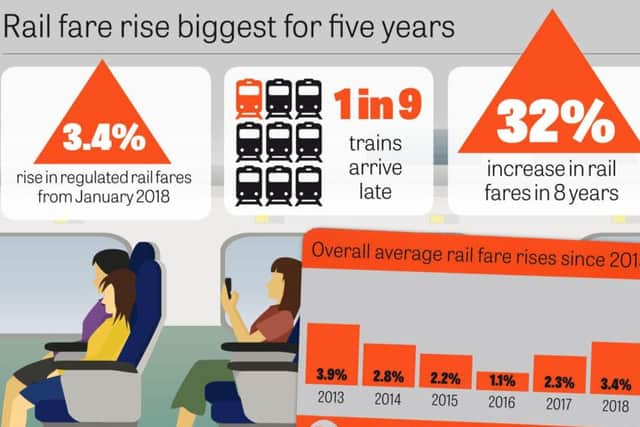New calls to reform railways as fares rise again
The announcement that passengers would be hit by the biggest fares hike in five years came just a day before the region’s biggest train operator starts to fine passengers £20 if they board a carriage without first buying a ticket.
The passenger watchdog Transport Focus compared the news of the price rises to “a chill wind blowing down platforms”, adding: “Many passengers face stagnant or falling incomes while rail fares continue to climb.”
Advertisement
Hide AdAdvertisement
Hide AdIt said fewer than half of passengers were satisfied with the value for money of train tickets.


Official figures show the rate of fare increases over the last decade to be more than twice that of food and the Consumer Prices Index.
The latest rises, which take effect in four weeks’ time, will add £40 to the cost of an annual season ticket from Leeds to Harrogate or Ilkley, and £48 to a similar ticket between Howden and Hull – taking the cost of that above £2,000 for the first time. An annual ticket on the fastest services between Leeds and York will now cost £2,312.
Anthony Smith, chief executive of Transport Focus, said: “Passengers are still seeing the basic promises made by the rail industry broken on too many days.”
Advertisement
Hide AdAdvertisement
Hide AdThe rise of 3.4 per cent announced yesterday is the sharpest since 2013, when fares increased by 3.9 per cent. The news led to renewed calls by Labour to renationalise of the railways. Shadow Transport Secretary Andy McDonald said: “This latest increase in rail fares is staggering. Private rail companies continue to cash in while passengers have to cough up.”


Manuel Cortes, general secretary of the Transport Salaried Staffs Association, warned that rail users were being “bled dry to ensure our private train companies stay in profit”.
Government figures in October showed that £4.2bn of taxpayers’ cash went to the rail industry in 2016/17, more than twice as much as the old British Rail used to get, accounting for inflation.
The Rail Delivery Group, the industry body made up of the train companies and Network Rail, said more than 97p in every pound from fares went back into “improving and running” the railway.
Advertisement
Hide AdAdvertisement
Hide AdChief executive Paul Plummer said: “Alongside investment from the public and private sectors, money from fares is underpinning the railway’s long-term plan to change and improve.”
The group’s chairman is Chris Burchell, managing director of Arriva Trains, whose Northern Rail subsidiary chose the week of the fares announcement to introduce a policy of imposing on-the-spot fines of £20 on commuters who use the busy Skipton and Ilkley routes and who try to buy tickets on board. The company had faced criticism from travellers and MPs for its previous policy of pulling passengers from ticket queues and issuing “telling-off” notices.
In one case, a 16-year-old girl was bundled out of Leeds Station by two officials.